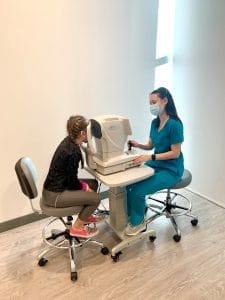Visiting Pediatric Eye Consultants of North Florida
Visiting the doctor’s office can be a scary thing when you’re young! We understand that, and we strive to make every child’s visit to our clinic a positive experience. Here’s what you can expect when you come to see us at our offices:
- After check-in, a member of Dr. Duss’ or Dr. Armanious’ team will greet you and bring you and your child into an exam room.
- The team member will ask a few basic questions about your child’s eye issue and how we can help you.
- Next, the team member will check a few standard parts of the eye exam. This might involve cool glasses, toys, movies, or other games. Children do best when they’re having a good time, so we work hard to make it fun!
- Dilating drops are almost always required at the initial visit, and then typically once a year, or sooner based on changes in condition. These drops serve two important purposes: they allow us to accurately determine the child’s need for glasses, and the prescription if necessary, and they let the doctor examine the important structures within your child’s eye, like the optic nerve and retina.
- After the dilating drops are applied, we will bring you back to the waiting room for you to relax and enjoy a movie from our Disney library while you wait for the drops to take maximum effect (30 minutes is necessary for children, who are different than adults due to accommodative ability).
- Dr. Duss or Dr. Armanious will complete the eye exam, discuss any questions you may have, and you’ll work together to formulate a customized treatment plan best suited to your family.
For your initial visit, please plan on spending 1 hour with us, to allow for enough time to thoroughly take care of your child. Future appointments, if needed, will be shorter, generally around 20-30 minutes.
Do I have to have eye drops?
Let’s be honest, no one is really that fond of eye drops. For children, getting dilating eye drops can often be the most stressful part of the visit to the eye doctor. This is probably our equivalent of shots as far as the kids are concerned. So this raises the question, is it really necessary that my child gets eye drops?
Dilating the pupils is an important part of a comprehensive eye examination in children. By opening up the pupil wide and using special equipment, we can get a 3-dimensional view of the inside parts of the eye to check for any abnormalities. But even more important than that for most children, it allows us to get the most accurate eyeglasses check possible. Children have a much stronger focusing ability than adults do and can easily lead the eye doctor astray during the examination. Dilating the pupil temporarily paralyzes the focusing muscle so that we can be sure on our measurements. For this reason, children typically get stronger dilating eye drops than adults do, which is why their eyes may stay blurry for up to 24 hours after the drops.
You should expect your pediatric ophthalmologist to recommend a dilated eye exam for your child upon your first visit with them and then roughly once a year thereafter depending on the situation. These exams do take longer as we have to wait for 30 minutes as the drops take full effect before finishing the eye exam. The whole visit could take around 1 hour, so please plan accordingly.
We are careful never to tell children that the eye drops won’t hurt. They can sting briefly and we don’t ever want to mislead a child. The technicians will usually put the eye drops in, and may request the assistance of the parents to do so. The goal is to get the eye drops in as quickly and gently as possible and move on to more fun things.
Preparing for the Exam
In general, we would recommend not making a big deal of discussing the eye drops in advance of the appointment. Though we are not wanting to ambush the child, we do find that spending a lot of time talking and thinking about it in advance usually increases their anxiety level greatly. Also, trying to talk them into it or bargaining usually just drags out the anxiety longer. Best to just get it over with quickly and move on. Although we certainly trust parents’ knowledge and judgment with regards to how their own children react, we still wanted to share our recommendations from experience over time.
To schedule an appointment, call (904) 425-5075
